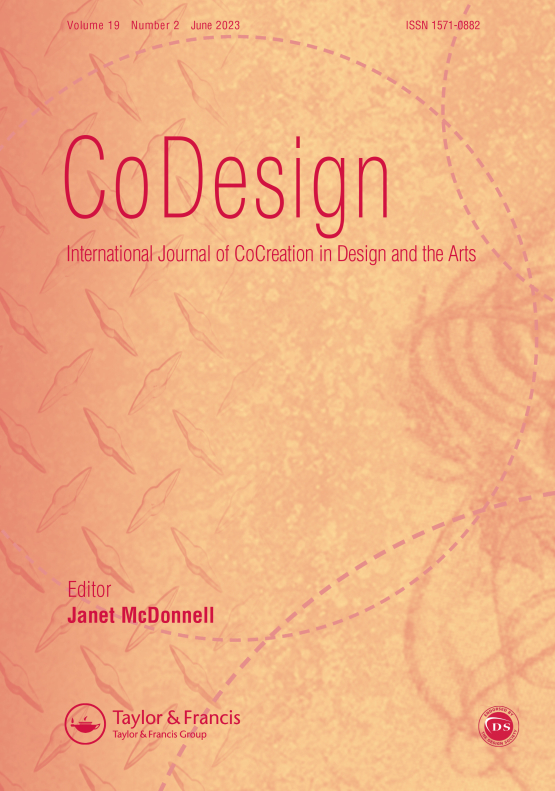Submit a Manuscript to the Journal
CoDesign
For a Special Issue on
Autoethnographies of social design practices
Abstract deadline
25 March 2024
Manuscript deadline
26 August 2024

Special Issue Editor(s)
Spyros Bofylatos,
Royal College of Art
[email protected]
David Perez,
Lancaster University
[email protected]
Autoethnographies of social design practices
This special edition is dedicated to adopting empirical, experiential and reflexive methodologies, namely autoethnography, in the context of collaborative design, including community-based design, co-design, participatory design, design for social innovation and similar approaches. We invite designers embedded in collaborative projects producing autoethnographies of practice reflecting on the experiences and challenges of their application of design with people.
Applying design in the context of communities of practices has emerged as a field that aims to address global challenges in a local and distributed context.
Design and designers contribute to the creation of context-specific, ‘sticky’ (VonHippel, 2006), tacit (Akama & Prendiville, 2013) or situated knowledge by applying their expertise through collaborative practices to foster the growth of the distributed design capacity (Manzini, 2015).
Through this call, CoDesign aims to raise interest, to valorise and to celebrate the people who daily practice design in social contexts, and to offer a platform to engage in introspection (Xue and Desmett 2019) as a tool of design research. In addition, it aims to explore the methodological implications of adopting
Autoethnography as a method of scholarly inquiry in the context of design.
Autoethnography is “a genre of academic writing that draws on and analyses or interprets the lived experience of the author and connects researcher insights to self-identity, cultural rules and resources, communication practices, traditions, premises, symbols, rules, shared meanings, emotions, values, and larger social, cultural, and political issues.”(Poulos 2021) The adoption of autoethnographic perspectives enables designers and communities to be situated within their context instead of being outside observers. This type of scholarship emphasises a deeper understanding of individuals, groups, and localities, prioritising creative forces such as intuition, imagination, and tacit knowledge over the divergence of generalist principles. The auto-ethnographic turn' in design (Schouwenberg & Kaethler, 2022) has the capacity to shed light on the practice of design and research around issues of sustainability and community.
This call for papers welcomes, but is not limited to, contributions that critically present the personal and collective narratives and reflection of working on the forefront of collaborative design. To achieve this, the special issue invites submissions that respond to one or more of the topics below:
- The adoption of reflective and introspective methods within design practice opens up the space for practitioners to discuss how the project affected the application of a methodology. How can design methodologies meet the unique needs of a particular project, and how can designers adapt their approaches to different cultural and social contexts? How can introspective research methods inform design theory?
- How is the management of tensions, conflicts, and differences among stakeholders in community-based design achieved? As design projects increasingly engage with diverse groups, conflicts are likely to arise. How can tensions and power dynamics be managed to ensure the long-term success of the project? How can we ensure that all voices are heard and that the resulting solutions are acceptable to all parties? What do the notions of authorship and ownership signify in the context of distributed design activities?
- Scaling up, replication and adaptation of design solutions in different settings has emerged as an essential aspect of collaborative design practice. It is important to acknowledge the differing perspectives of the Global North and South, as well as the impact of colonising/de-colonising approaches on community-based design. How are the dimensions of a locality, such as its material and cognitive resources or culture, integrated into collaborative design practices in action?
- The development of strategies of self-care for designers and other practitioners embedded in social design environments is essential for collaborative design. Designers and practitioners embedded in social contexts can be exposed to a range of taxing situations. How can the burden of designing within challenging environments be managed? How can care practices lead to a comprehensive exit strategy for designers embedded in communities?
Looking to Publish your Research?
Find out how to publish your research open access with Taylor & Francis Group.
Choose open accessSubmission Instructions
Submission Instructions
We invite 1000 word extended abstracts that align with this special issue call for papers. These should be sent by email to [email protected] (Royal
College of Art ) and [email protected] (Lancaster University) by 24th March 2024 (AoE) in MS word (.doc or .docx). Abstracts will be reviewed by the Joint Guest Editors.
Following an initial evaluation of the abstracts, full manuscripts will be invited from selected authors, with a brief review appended. Once submitted, these will be subject to the normal review procedure of the Journal.
February 2024 Launch of call
March 2024 Deadline of submission for 1000-word abstracts
April 2024 Post-review notification of decisions on abstracts
August 2024 Submission of full manuscripts
September 2024 Post-review notification of decisions on full manuscripts
November 2024 Deadline for the submission for revised manuscripts
January 2025 Final selected manuscripts to production
Spring 2025 Publication of special issue